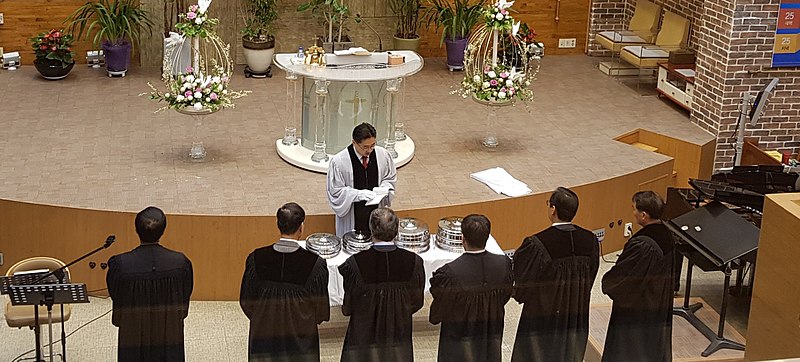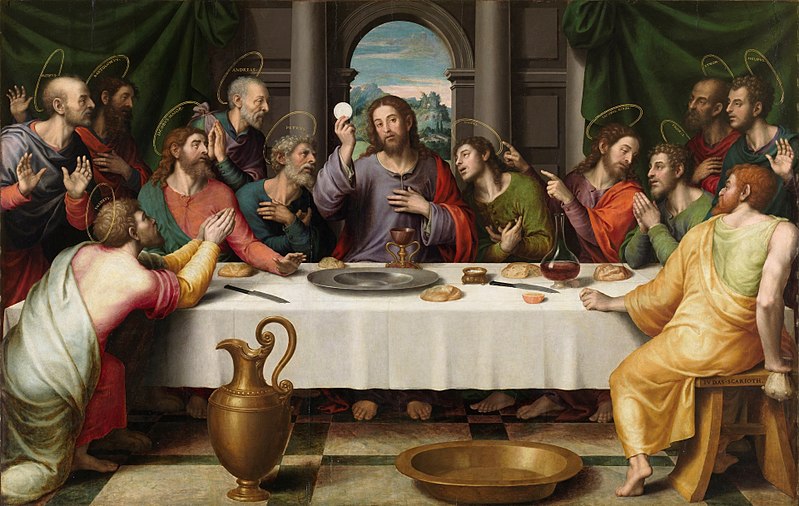(前編を読む)
この問題の別の兆候は、ある福音派が持つ、洗礼に対する深い恐れだ。テキサス州ダラスにある単立教会に出席した時のことだが、ある日曜日に400人ほどが集団で洗礼を受けていた。彼らの伝道にどれほど効果があり、どれだけ熱心に主の戒めを守りたいと思っているかが分かる。この洗礼式では、4、5人がステージに上げられ、入信の証しをするために牧師が質問をしていた。それぞれの人への最後の質問として牧師が聞いたことは、「でも、この洗礼があなたを救うとは信じていないでしょう」だった。これはただの質問ではない。何度も何度も尋ねたことなので、この牧師が「サクラメント」の力をとても恐れていることが伝わってきた。そして、一人ひとりが洗礼を受ける前に牧師がこの質問をしていたという事実は、「サクラメント」が、神が人を祝福する手段ではなく、人間関係の働き、つまり「その人の個人的な信仰行為」だったことを示している。
[toggle]Another sign of the problem is the deep fear some evangelicals have of baptism. I attended an independent church in Dallas, Texas, on a Sunday on which they were having a mass baptism for some 400 people. This speaks well of the effectiveness of their outreach and their desire to obey the commands of their Lord. As part of the service, four or five people came on stage and were interviewed by the pastor to help them give their testimony. At the end of each testimony, the last question the pastor asked each was this: “But you don’t believe that baptism saves you, right?” It wasn’t just the question, but the leading way in which it was asked time and again that suggested to me that the pastor was deeply afraid of the power of the sacrament. And the fact that he also asked this right before each person was baptized went a long way into ensuring that the sacrament did not become a means by which God broke in and blessed the recipient but became all about the horizontal: an act of the person’s faith. [/toggle]
聖餐式(写真:칼빈500)
聖餐の状態はもっと悪い。福音派が始まったばかりの頃の教会では、もちろん彼らは世に出て行ってキリストを伝えることには誠実だったが、その聖餐の執行は、率直に言えば冒涜(ぼうとく)行為だった。もちろん、失われた人を捜し求め、不必要な文化的・宗教的な障害を取り除いたということは評価に値する。少なくとも聖餐式をしていたことは褒(ほ)めるべきかもしれない。しかし多くの教会では、献金の時間、聖餐にあずかりたいと感じた人だけが、わきの通路の小さいテーブルに置かれたクラッカーとジュースを取っていただけだった。聖句が読まれる時もあったが、そうでない時もあった。
[toggle]The state of the Lord’s Supper is in a worse state. I’ve lost track of the number of startup evangelical churches—again, who are sincerely seeking to reach the world for Christ—whose practice of Communion is frankly a sacrilege. One has to give them credit for, yes, seeking out the lost and taking down unnecessary cultural/religious barriers. And one has to also praise them for at least offering Communion. But in many churches, it is something that is presented during the offering, at a small table holding crackers and juice on the side aisles for those who feel so led to partake. Sometimes this is accompanied by the words of institution, but sometimes it is not. [/toggle]聖餐という考え、つまり、主の儀式に参加するそれぞれの人による「キリストの体」という共同体の交わりは失われてしまった。「聖餐が信仰生活の中心である」と礼拝の指導者が強調する努力が失われているのは言うまでもない。
[toggle]The idea of Communion—of the body of Christ participating with one another in an ordinance of their Lord—is completely lost. Not to mention the loss of any concerted effort by worship leaders to highlight why the sacrament is a central feature of Christian life. [/toggle]これは、18世紀後半から19世紀前半までの福音派の教会とは対照的だ。今日の福音派のクリスチャンは、週末のすべてを使って準備を整えた上で聖餐にあずかるなど、ほとんどないと言っても過言ではない。聖餐は、信じていない人にとっては「退屈だ」と思われており、さらに教会員にとっては「意味のない儀式」ととらえられている。しかしそれでも、「初めてキリストを親密に知るようになったのは聖餐式においてだった」という人が何千もいる。
[toggle]In contrast to the evangelical churches of the late 1700s/early 1800s, it almost goes without saying that few if any evangelical congregations today would dedicate a whole weekend to preparing and then participating in Communion. It would not only be perceived as a turnoff to unbelievers but a meaningless rite to members. And yet it was at Communions that thousands upon thousands came to know Christ intimately for the first time. [/toggle]確かに今日、聖餐をとても真面目に行う福音派の教会は、(教会の典礼を重んじる)高教会にも(個人の回心や聖化を重んじる)低教会にも、聖公会にもバプテストにもある。「サクラメント」に関する神学的立場がどうであれ、「これは手段だ」と彼らは言うだろう。自分の外にある人格を思い出すために、外へと引き出される手段。外にある人格というのは、霊的な感覚を与えるだけではなく、罪を背負って十字架に死に、救いのために死からよみがえられた方のことだ。
[toggle]To be sure, today one can find evangelical churches, high church and low, Anglican and Baptist, who take the Lord’s Supper with utmost seriousness. They—no matter their theology of the sacrament—will say it remains a means by which they are drawn out of themselves to remember the One outside of themselves, who didn’t just come to give them affirming spiritual feelings but to die on a Cross for their sins and to rise again for the dead for their salvation. [/toggle]
フアーネス「最後の晩餐」(プラド美術館蔵)
バプテストの兄弟姉妹が主張していたことを思い出そう。「これは私たちの主が定められたことだ」と。「行って……父と子と聖霊の名によって洗礼を授け」(マタイ28:19)、「わたしの記念としてこのように行いなさい」(1コリント11:24、25)。聖餐と洗礼の「サクラメント」を、真剣さと献身、敬意をもって定期的に行うようになるまでは、福音派が霊的な昏迷(こんめい)と人間関係の働きにとらわれていることから回復するとは思えない。主の明確な命令に従うようになるまでは。
[toggle]We do well to recall the emphasis that our Baptist brothers and sisters insist on: that these are practices ordained by our Lord: “Go … baptizing in the name of the Father, Son, and Holy Spirit” and “Do this in remembrance of me.” I do not believe evangelicalism will recover from its spiritual stupor, its fascination with the horizontal, until it once again practices regularly and respectfully, with earnestness and devotion, the sacraments of baptism and the Lord’s Supper. Until, that is, it obeys the clear commands of its Lord. [/toggle]前進するためには、各個教会が持つ洗礼と聖餐の神学に頼るところが大きい。
[toggle]As for the way forward—well, a lot depends on a particular church’s theology of baptism and the Lord’s Supper. [/toggle]しかし、いくつかの提案をさせてもらいたい。
[toggle]But let me hazard some suggestions. [/toggle]まず、どんなに洗練された聖餐の神学があっても、ある教会ではすでにそうなっているように、聖餐式を個人主義的な行為にしないようにしよう。礼拝の中で行われないなら、つまり、すべての教会員や信者がそこに招かれていないのなら、聖餐を拒否する。まずそこからスタートしよう。
[toggle]First, I don’t think any sophisticated theology of Communion would make it an individualistic act as it has become in some churches. Simply refusing to offer Communion unless it is a part of the service in which every member or believer is invited—that’s a start. [/toggle]強い抵抗があっても、聖餐に焦点を絞った修養会をする教会もあるかもしれない。聖餐について教え、それぞれを整えるために祈り、クライマックスとしてパンと杯を受ける。
[toggle]Against all odds, a church might very well offer a weekend retreat in which the focus is Communion—with teaching and times of prayer to prepare oneself—and the climax being the receiving of the bread and cup. [/toggle]洗礼について言えば、幼児であっても、「回心後(どの神学的立場でも)、できるだけすぐに洗礼を受けなさい」という分かりやすい主の教えを守ろう。洗礼を授ける時は、「それは何々ではない」などというような説明でその行為の邪魔をしないように。自分の信じていることが何かを言うだけ、そしてシンプルにそうするだけだ。教会の洗礼に対する神学を説明する機会はほかにもある。だから、洗礼の間は「サクラメント」の視覚的な力と、注意深く選ばれた短い言葉にその働きを任せよう。洗礼には究極の効力はないが、強力な象徴であると信じることができるし、この力強い象徴はそれ自体が多くを語っている。
[toggle]As for baptism: Let’s insist that as soon as possible, as infants or after conversion (whatever your theology), that we obey the plain command of our Lord to baptize. And then when we do baptize, let’s not get in the way of the act by explaining it away, that is, saying what it is not. We might just say what we believe it is, and do so simply. There is a time and place to teach a church’s theology of baptism, but during the baptism, we should let the visual power of the sacrament, and a few well-chosen words, to the work. You can believe that baptism as such has no ultimate efficacy and still recognize that it is a powerful symbol, and as a powerful symbol, it speaks volumes. [/toggle]この連載で、「聖餐には定期的に、そして敬虔な態度で参加するように」と提唱している理由の一つは上で述べたとおりだが、そうすることで私たちの注目が、聖餐卓の上や洗礼の水の中で何が起こっているかに向けられる。私たちは、自分の外、キリストがその民を祝福する物理的な手段に目を向けるべきなのだ。「サクラメント」は私たちに、自分の内にある感情にとらわれるのではなく、神に目を向けるように、イエス・キリストによって神が私たちのために何をしてくださったかに目を注がせる。
[toggle]In the context of this series, one reason I advocate the regular and reverential participation in the sacraments is because, as noted above, they require us to look at what is happening at the altar/Communion table or in the waters of baptism. We are required to look outside ourselves, to the physical means by which Christ blesses his people. Rather than encouraging us to ponder the feelings that are going on inside us, the sacraments require us, however briefly, to focus on God and what he has done for us in Jesus Christ. [/toggle]次週は、説教がどう歪んでしまったか。
[toggle]Next week: How our preaching has gone awry. [/toggle]執筆者のマーク・ガリは「クリスチャニティー・トゥデイ」の編集長。
本記事は「クリスチャニティー・トゥデイ」(米国)より翻訳、転載しました。翻訳にあたって、多少の省略をしています。
出典URL:https://www.christianitytoday.com/ct/2019/july-web-only/whatever-happened-to-communion-baptism.html
